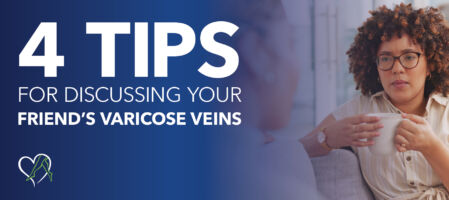
Bringing up a sensitive health issue like varicose veins with a friend can be stressful, but it's an important conversation that can lead to better health outcomes. Varicose veins can cause discomfort and impact your friend’s quality of life, so discussing them with care and empathy is essential.
The very definition of being a friend means offering unwavering support through life's ups and downs and a shoulder to lean on in times of need. Being a friend also entails being honest and forthright, even when the truth might be uncomfortable—and caring enough to provide helpful counsel and resources when necessary.
We'll explore four thoughtful suggestions on approaching the delicate topic of varicose veins and vein disease so that you can provide your pal with the support they may need to manage their vein health.
Timing and setting are crucial when discussing a sensitive issue like varicose veins. Pick an appropriate time and place for your discussion to ensure a productive, open, and compassionate conversation. Opt for a private, comfortable environment where your friend can feel relaxed and safe. Avoid addressing the topic in public or crowded settings to protect their privacy and comfort.
As for when, look for a moment when you both have sufficient time to talk without distractions or interruptions. Your friend mustn't feel rushed or pressured during this conversation. By selecting the right time and place, you create a supportive atmosphere for discussing their varicose veins openly.
Initiating the conversation with genuine concern and empathy is critical to making your friend feel understood and cared for. Start by acknowledging your observations without judgment. For example, you might say, "I've noticed you've been experiencing leg discomfort lately, and I'm genuinely concerned about your well-being." This approach shows that you've been paying attention and are approaching the topic from a place of love and care.
Empathetic language can help your friend feel more at ease during the discussion. You can express your understanding of how varicose veins can affect their daily life and self-esteem. By highlighting your empathy, you encourage an open and supportive dialogue, making it easier for your friend to share their thoughts and feelings.
Ensure your friend knows you're there to support them, not to pass judgment. Caused by malfunctioning valves within the leg veins, vein disease (the root cause of varicose veins) can cause other symptoms such as spider veins, leg swelling, skin changes, leg heaviness or fatigue, restless legs, and if left untreated, leg ulcers.
Varicose veins can develop for various reasons, including genetics. That’s why it's important not to make assumptions or criticize them for their condition. Instead, offer your unwavering support and a listening ear.
Let your friend lead the conversation. Please encourage them to share their experiences, feelings, and concerns. If they express discomfort or embarrassment about their varicose veins, reassure them that you're there to help them find solutions, not to criticize or make them feel self-conscious.
Avoid offering unsolicited advice or solutions unless your friend asks for it. Focus on being a compassionate and understanding presence in their life and let them decide how they want to address their varicose veins.
If your friend is receptive to discussing their varicose veins, provide them with helpful information and resources. Suggest that they consult a qualified healthcare professional to assess their condition and explore potential vein treatment options. You can offer to assist in researching reputable specialists or clinics in their area.
An excellent resource for complete care for your friend’s venous insufficiency (also known as vein disease) is Center for Vein Restoration (CVR). CVR is the largest physician-led vein center in the United States, treating over 200,000 patients annually with a 98 percent satisfaction rating. When was the last time you heard 98 percent of people agreeing on ANYTHING?!
With over 110 vein clinic locations nationwide, there’s sure to be a CVR near your friend. Tell your friend that CVR accepts many insurances, including Aetna, Amerigroup, Anthem, Blue Cross/Blue Shield, Cigna, MultiPlan, Medicaid, Medicare, and more.
Bringing up your friend's varicose veins may be a delicate conversation, but it's rooted in care and concern. By choosing the right time and place, expressing empathy, being supportive, and offering information and resources, you can create a safe space for them to open up about their condition. Remember that your role is to be a supportive and understanding friend, and by approaching this topic with sensitivity, you can strengthen your bond while helping them address their varicose veins.
Of course, it’s essential to educate yourself about varicose veins beforehand so you can share accurate and relevant information. Mention that there are both medical and lifestyle interventions available to manage varicose veins effectively. You empower your friend to take charge of their health by offering guidance and resources.
And maybe you’ll help yourself along the way, too, if you are experiencing leg cramping, swelling, itching, and, of course, varicose veins.
Patients inspire us every day.
Led by physicians, Center for Vein Restoration (CVR) is motivated by the patients we serve to offer the most advanced, customized outpatient treatment options for vein disease in the nation. CVR’s vein doctors are board-certified experts and provide safe, comfortable solutions to unsightly varicose veins and spider veins that take an hour or less to complete in the office. Patients return to their normal activities immediately, with few restrictions.
CVR accepts many insurances, including Aetna, Amerigroup, Anthem, Blue Cross/Blue Shield, Cigna, MultiPlan, Medicaid, Medicare, and more.
Questions about insurance or how to schedule an appointment? Call 240-965-3915 to speak to a Patient Services Representative or schedule your consultation online at a CVR near you today. You can also schedule an appointment online HERE.